Take it from this rabbi: You should binge-watch Netflix’s ‘Long Story Short’ for the High Holidays
This past Saturday night, during Selichot services, I led members of our congregation in our first recitation of “Ashamnu,” the confessional acrostic that we accompany by striking our hearts.
There will be many recitations of the confessional to follow in the coming weeks. Yet it is the first — said late at night, and not, in my community, in the midst of a great throng but instead in an intimate circle — that always moves me the most. I have long loved Selichot, which on the Saturday night before Rosh Hashanah begins a cycle of prayers for forgiveness. It is an experience that, for me, offers an invitation into the heights of the holidays themselves, but without the attendant rabbinic pressures — and it is often a highlight of my own Jewish year. So it was this week.
And then I went home, still humming “Ashamnu” and still thinking about my friends and family who sang it along with me, and something rather incredible happened. I turned on Netflix and there they were again: “Ashamnu,” Selichot and the extraordinary drama of the High Holidays, as I have never before seen them depicted in anything remotely mainstream.
In a storytelling landscape that almost always depicts American Jewish ritual life in terms that are wildly unrealistic (“Nobody Wants This”), pediatric (“You Are SO Not Invited To My Bat Mitzvah”), or chaotic bordering on hostile (“Bad Shabbos”), this was something different. In an unusually effective scene, one of the central characters in “Long Story Short” finds herself in shul, unexpectedly, on Yom Kippur. Like so many other scenes in Raphael Bob-Waksburg’s animated series about a Jewish family, it was letter-perfectly accurate, loving and profound. It was astonishing.
If you have already seen it, then you know. And if you have not seen it, in all seriousness and as a rabbi, I am advising you to binge the entire 10-episode run over the next week in preparation for Rosh Hashanah.
What is so incredible about the “Ashamnu” scene in particular — and this could also be said of the series as a whole — is how artfully it plays against much of what we’ve come to expect from depictions of synagogue life on television. Contemporary Jewish American artists, from Larry David to the Coen Brothers (many of them, perhaps, let down by synagogues at some point) tend to use synagogue scenes as grist for an endlessly satiric mill — the staid sanctuaries in which an unrepentant Larry commits his peccadillos, the horrific vacuousness of suburban Jewish life in “A Serious Man.” There are scattered exceptions, of course, and I admire both David and the Coens as brilliant and important Jewish storytellers. But there is more to say about Jewish American life, and synagogue-going, than is possible to say from within the four narrow cubits of satire.
Enter “Long Story Short,” which is certainly the most Jewish television show airing right now on any mainstream platform and also, very likely, among the most authentic pieces of Jewish American narrative art in the 21st century. And it is very funny. There are moments of satire, in particular a riotously funny send-up of bar mitzvah candle-lighting ceremonies in the opening episode. But unlike most other shows of its ilk, Judaism and the Jewish characters that populate the story (which is all of them, more or less) aren’t the joke. They are simply the reality, the context by which tragedy transforms itself into farce and farce, in turn, transforms itself into tragedy again.
And, though it might seem like a surprising thing to say about an animated series, it presents that reality with unflinching, almost documentary-like precision. Some examples:
- An unnamed character in the “Ashamnu“ scene appears in a full tallit (no church-style stole, like the one worn by Rabbi Noah Roklov in “Nobody Wants This”) and, when asked by a main character if he knows of “a guy named Noah here,” replies dryly, but not unkindly, “There are probably like 50 Noahs in here.”
- An old woman, also in a tallit, next to whom the main character takes a seat, explains lovingly that Jews confess in plural language.
- The episode that is largely devoted to parents trying to decide whether or not to send their children to a Jewish day school.
- The moment when an adult child, faced with a sibling’s increasing observance, tells their mother that there is no one right way to be Jewish, and the mother responds immediately (and I quote) with, “But there is — a progressive egalitarian Conservative Judaism with an emphasis on ritual and community over faith and blind practice. That’s literally the only way it makes sense. I figured it out. And I gave it to my children because I love them. But they reject it because they want to reject me.”
These examples — one of a vast number that I could recite — all speak to a core aspect of why I found the show so moving on Selichot night and why it is so wildly successful overall, both narratively and aesthetically. It’s packed with so many highly specific Jewish cultural and religious touchstones — not to mention untranslated and unexplained Hebrew phrases — that I suspect, absent a solid day-school education (Bob-Waksberg, the son of a Jewish educator, had one), aspects of it would seem abstruse if not unintelligible. It’s all so ardently, shockingly particularist, which is a crucial element of faithfully rendering any culture and something that I think about a lot, both as novelist and as a rabbi.
As Jews in America, most of us, either through osmosis or because we seek it out, come to know a great deal about the majority cultures that surround us. They know less about us. That has always been — and will always be — a structural aspect of minority experience. That is why it is an ongoing challenge, in many corners of the entertainment industry, to tell stories from the particularist perspectives of minority and under-represented groups. It’s a worthy, important goal, both ethically (because it’s the right thing to do) and aesthetically (because stories absent culture are bland).
But despite all the laudable effort towards diversifying the kinds of American stories we tell, I have never seen a show that depicts a Jewish American reality that is recognizable to me — hilarious, unabridged, profound and reverent. Until now.
Representation matters. Do yourself a favor and start binging.
‘I never stood with Bibi,’ Cuomo says as Netanyahu figures large in the NYC mayor’s race
This piece first ran as part of The Countdown, our daily newsletter rounding up all the developments in the New York City mayor’s race. Sign up here to get it in your inbox. There are 49 days to the election.
2️⃣ Cuomo polling second
-
Andrew Cuomo, the former governor who is polling second, has called for an end to the war in Gaza for the first time.
-
“There is no doubt that the people of New York and the nation see the continued carnage that is happening and are deeply, deeply disturbed and want it over, and believe it has gone on way too long,” Cuomo said in a New York Times interview published late Monday. He added, “It should end today. Return the hostages, end the violence. Today. I think it should have been over months ago.”
-
The comments marked a departure for Cuomo, who has long fashioned himself a “hyper-aggressive” supporter of Israel and has accused Zohran Mamdani of “fueling antisemitism” as the frontrunner wielded much stronger criticisms of Israel. After appearing to criticize Gaza’s aid crisis in August, Cuomo quickly clarified that it was just “some people” — not him personally — who questioned Israel’s conduct.
-
Cuomo’s latest comments come amid a historic decline in support for Israel among Democratic voters. They also come as polling shows that New York City voters strongly prefer Mamdani’s position on the Israeli-Palestinian conflict over Cuomo’s.
-
Cuomo chastised Mamdani for his renewed pledge to arrest Netanyahu as mayor, and he avoided criticizing the Israeli leader himself. But a year after volunteering to join Netanyahu’s legal defense against a warrant issued by the International Criminal Court, Cuomo placed some distance between them: “I never stood with Bibi,” he said.
👀 Adams watch
-
Mayor Eric Adams is taking a different tack when it comes to Netanyahu, posting a picture of himself shaking the Israeli prime minister’s hand.
-
“As Mayor of New York City, I’ll never forget the warm welcome I received in Israel from Netanyahu and the Israeli people,” he said on X. “I look forward to returning that hospitality when the Prime Minister comes to New York for the United Nations General Assembly.”
-
Adams also met with Jewish leaders in the heavily Orthodox Brooklyn neighborhood of Borough Park, bought a packet of honey cookies for Rosh Hashanah at Weiss Bakery and smiled while Rabbi Moshe Davis blew a shofar for him at Eichler’s Judaica.
-
He is counting on a cohort of Jewish voters who strongly support Israel. According to a Times/Siena poll last week, 40% of Adams voters are Jewish. But they aren’t enough to save his single-digit polling numbers.
🍎 Jews share food and reflect on Mamdani
-
Our reporter Grace Gilson swung by a food distribution event by the Met Council, a Jewish social services nonprofit, to hear what Jews are saying about Mamdani and food affordability on Monday.
-
Passing out crates of Kedem grape juice, Met Council CEO David Greenfield said they planned to distribute 1.7 million pounds of food — reaching over 200,000 people — for the High Holidays this year.
-
Greenfield said he was “keeping an open mind” about the candidates and Mamdani’s promise to make the city more affordable. “I think it’s important to broaden the tent, and so I genuinely do look forward to hearing what he has to say and evaluating it from there,” he said.
-
Comptroller Brad Lander also showed up. He suggested that Mamdani’s proposed city-run grocery stores could stock kosher food.
-
“Mayor Mamdani will be a partner with Met Council and making sure that New Yorkers who need kosher food have a chance to get it, whether they’ll do that through the city-run grocery stores, or whether they’ll do that through Met Council,” said Lander.
🚫 Non-endorsement tracker
-
Mamdani got Gov. Kathy Hochul’s endorsement on Sunday — but other New York Democrats didn’t fall in line, highlighting the party’s internal tensions ahead of election day.
-
“I will not be endorsing Mamdani,” said Long Island Democratic Rep. Tom Suozzi on Monday. “While I share his concern about the issue of affordability, I fundamentally disagree with his proposed solutions.”
-
Laura Gillen, another Democratic Long Island Rep., also issued an anti-endorsement. “I completely disagree with the Governor’s endorsement of Mr. Mamdani,” she said in a statement to Politico. “Long Islanders are already facing a cost-of-living crisis and the last thing they can afford is Zohran Mamdani’s reckless agenda.”
-
Top New York Democrats Sen. Chuck Schumer and Rep. Hakeem Jeffries are still staying quiet.
🐝 Social media buzz
Israel launches ground operation in Gaza City, as Marco Rubio casts doubt on diplomatic end to war
Israel has launched a major ground operation in Gaza City, a months after its government approved a plan to take over the city despite the objections of military leaders and hostage families.
“Gaza is burning,” Defense Minister Israel Katz tweeted. “The IDF strikes with an iron fist at the terrorist infrastructure and IDF soldiers are fighting bravely to create the conditions for the release of the hostages and the defeat of Hamas. We will not relent and we will not go back — until the completion of the mission.”
Israeli Prime Minister Benjamin Netanyahu announced the operation from a Tel Aviv courtroom, where a day of testimony in his ongoing corruption trial was cut short by the development.
Israeli leaders say Gaza City is a last major Hamas redoubt and conquering it is essential to defeating the group that launched the war with its attack on Israel on Oct. 7, 2023. The army had issued an evacuation order for the roughly 1 million civilians living in the city, many as refugees, and about a third are thought to have departed so far.
Relatives of the 48 remaining hostages in Gaza, of whom 20 are thought to be alive and held at least in part above ground in Gaza City, launched a sit-in outside Prime Minister Benjamin Netanyahu’s Jerusalem residence to protest the operation.
“Our loved ones are being shelled by the IDF on the prime minister’s orders. He is doing everything to prevent a deal and to prevent their return,” said Anat Angrest, the mother of captive Matan Angrest. “We are worried that this will be their last night, we are no longer ready for it.”
The invasion follows weeks of intense bombing and began while U.S. Secretary of State Marco Rubio was on the ground in Israel for the first time since taking his position earlier this year.
Rubio and Netanyahu held a press conference after meeting on Monday in which Rubio struck a more pessimistic tone than his boss, President Donald Trump, about the potential for ending the Gaza war through negotiations.
Asked about the possibility of Hamas agreeing to disarm, Rubio said that he, like Trump, would prefer to see a diplomatic resolution to the war. But he repeatedly cast doubt on whether that could happen.
“I think we have to be prepared for the fact that savage terrorists don’t normally agree to things like that, but we’ll continue to pursue that route,” he said, according to a State Department transcript. “It’s the ideal outcome. But it may require ultimately a concise military operation to eliminate them.”
He and Netanyahu declined to say whether they had discussed the planned Gaza City invasion specifically.
Rubio remained in Israel overnight as the ground operation began, before he was due to travel Tuesday to Qatar, the U.S. ally that Israel bombed last week in a failed attempt to assassinate Hamas’ political leaders who are housed there. Qatar has played a key role in brokering so-far-unsuccessful talks aimed at ending the war.
During his Israel visit, Rubio also visited the Western Wall with Netanyahu and U.S. Ambassador Mike Huckabee and visited a contested archaeological site whose critics say is designed to solidify Jewish claims in East Jerusalem, the proposed capital of a future Palestinian state. The visit comes on the eve of several countries’ recognition of a Palestinian state during this month’s United Nations General Assembly, in moves that the countries’ leaders are mounting as a response to Israel’s prosecution of the Gaza war.
Two synagogues and Chabad building in Halifax, Canada, targeted with antisemitic graffiti
Three synagogues in Halifax, Nova Scotia, were defaced with antisemitic graffiti over the weekend, following a contentious period in the Canadian city over an athletic match that included the Israeli team.
Beth Israel Synagogue and a building associated with the Chabad-Lubavitch of the Maritimes had the phrase “Jews did 9/11” written on them with spray paint. Another synagogue on the same street as Beth Israel, Shaar Shalom, had a swastika spray-painted on its signage.
“The targeting of synagogues in Halifax with antisemitic graffiti is absolutely disgraceful. We are better than this as a province,” said Nova Scotia Premier Tim Houston in a post on X.
The graffiti came days after hundreds gathered outside the Davis Cup tennis competition in Halifax to protest Israel’s participation in the match against Canada. The match was held Friday behind closed doors, with no spectators or media allowed due to safety concerns.
“Whether intimidating sports fans, threatening elected officials, or targeting people at their places of worship, this is absolutely unacceptable in Canada — an assault on our core Canadian values,” wrote Center for Israel and Jewish Affairs CEO Noah Shack and Atlantic Jewish Council executive director Yoram Abisror in a post on X.
Halifax Regional Police released a photo of a man suspected of writing the antisemitic graffiti in a post on Facebook Monday, adding that the individual had also defaced nearby sidewalks three separate times.
The incidents are being investigated as hate crimes, and police are conducting “extra patrols” at local synagogues and religious buildings, according to the post.
“Directing hate to an entire section of our community is against the law, but most importantly, it does not represent the views of our city,” said Halifax Regional Police Chief Don MacLean in a statement. “The loudest voices are not always rooted in wisdom, fact or truth.”
As Micah Lasher launches bid to succeed mentor Jerry Nadler in Congress, here’s a rundown of the field
The heir apparent to the most senior Jewish member of Congress has officially launched his campaign.
Micah Lasher debuted a video Monday making the pitch for why he should replace his mentor Jerry Nadler in representing New York’s 12th Congressional District in Washington, D.C. The two-minute ad shows him strolling through Manhattan’s Riverside Park and vowing to fight back against Donald Trump.
Nadler, 78, announced earlier this month that he would not seek reelection after 33 years representing a district that is one of the most Jewish in the United States, covering the Upper West and Upper East sides and all of Midtown Manhattan, and is seen as a “crown jewel” of New York politics. He cited the need for a changing of the guard in the Democratic Party.
Lasher, who is Jewish, said in his launch video that the party needs change if it’s going to stand up to Trump — but he also offers a portrait of continuity. The video also showcases him talking with Nadler (outside a deli, not Zabar’s) and strategizing with Mike Bloomberg, the centrist Jewish politician and businessman who was mayor from 2002 to 2013.
He’ll contend against an untold number of other candidates in the Democratic primary next June. Some have already entered the race — including one who jumped in before Nadler got out. The field spans a wide spectrum of viewpoints, including on the city’s mayoral candidates; features a mix of household names and far less familiar faces; and ranges in age from 26 to 79. The potential successors have held elected office anywhere from zero days to three decades. Most of them are Jewish or part of Jewish families, and some have records of pro-Israel advocacy.
Here’s what each of them has said publicly about antisemitism, Israel and Jewish topics.
Alex Bores
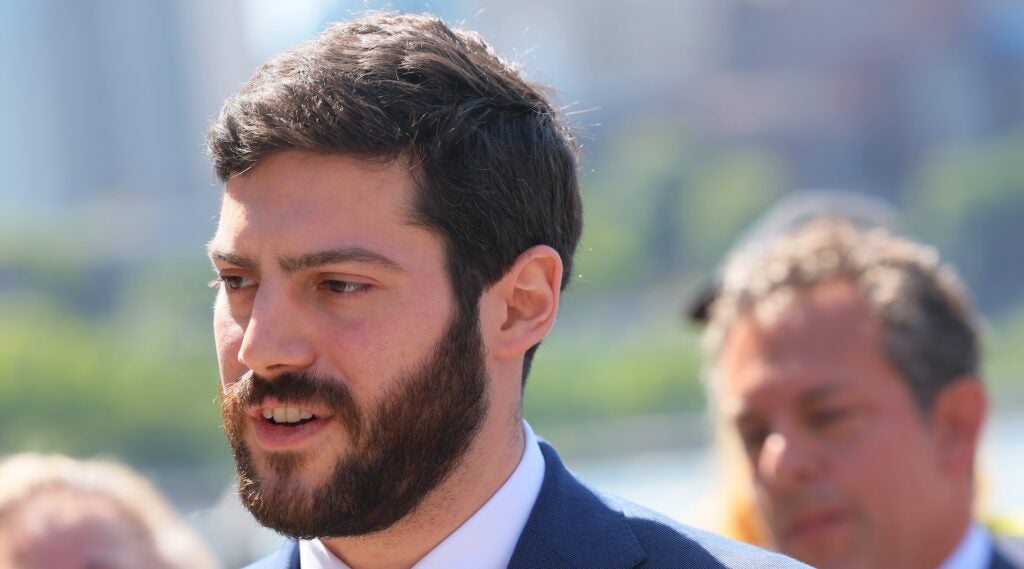
(Michael M. Santiago/Getty Images)
Alex Bores, 34, is a second-term assemblymember representing the Upper East Side and the east side of Midtown Manhattan. Bores has passed artificial intelligence protections and written legislation on issues like gun safety and employee intellectual property rights.
Bores is not Jewish but his wife, Darya Moldavskaya, is. “I want to thank Alex for marrying a nice Jewish girl,” Bores’ mother, Lori, said during her toast at her son’s wedding, according to Our Town. “I have always admired the tradition of a relationship between the parents of two people who marry. So now Boris and Nadya [Darya’s parents] are my machatonim.”
Since taking office in 2023, Bores has consistently voiced support for and attended Jewish institutions and events. He attended Temple Emanu-El’s 180th anniversary celebration this past spring. In 2023, he spoke at the “Landing Day” ceremony, which honored the anniversary of the first Jews who arrived in then-New Amsterdam. That same year, he said he was “proud to join” the Jewish Community Relations Council’s annual meeting. In 2024, Bores attended the JCRC’s early celebration of Rosh Hashanah, during which he did tashlich, the symbolic casting off of sins, into the Hudson River. Bores also attended this year’s Israel Day parade on Fifth Avenue, which the JCRC hosts annually.
On the day of Hamas’ Oct. 7, 2023, attack on Israel, Bores tweeted that he was “horrified,” and that “Israel must and will repel these terrorist attacks.”
In 2023, he introduced a bill that moved back the city’s petition filing deadline from the date of the second Passover seder. “Though not by design,” Bores wrote, “the prior deadline would impede Jewish candidates and staffers observing Passover.”
Bores, who attended the elite Hunter College High School, spoke last year to students from his alma mater during a visit to the Museum of Jewish Heritage; he has made numerous visits to the Lower Manhattan museum, which operates mainly as a memorial to the victims of the Holocaust.
Bores told the New York Times he was “humbled” by the support he was receiving following Nadler’s announcement, but had not reached any decision about whether to run.
Erik Bottcher
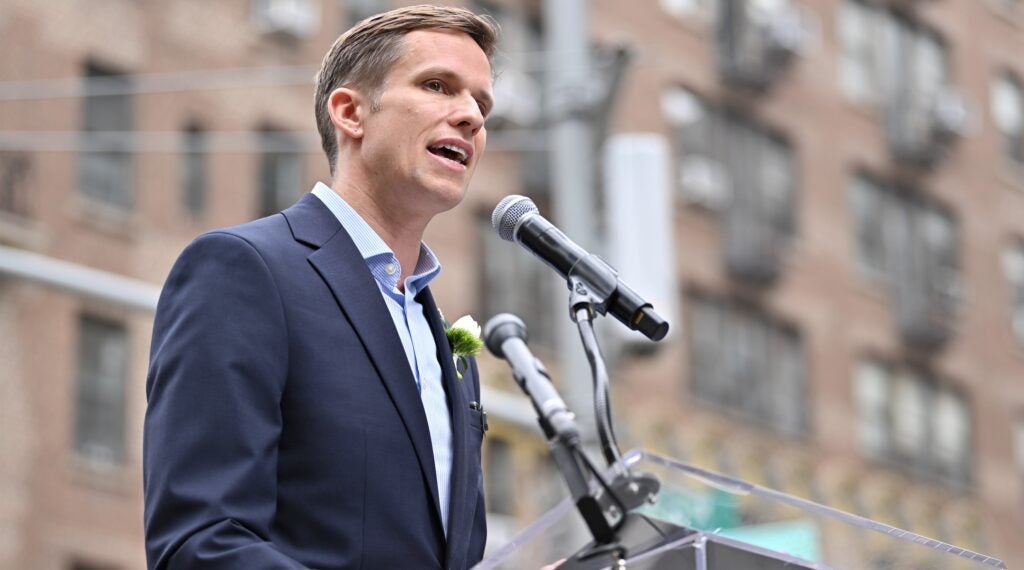
(Roy Rochlin/Getty Images for Tom Kirdahy Productions & The Terrence McNally Foundation)
Erik Bottcher, 46, has served on City Council since 2022, representing a district that covers west side neighborhoods including Chelsea, Hell’s Kitchen and the West Village.
He told The New York Times that he was seriously considering running to replace Nadler, whom he praised as “among the most effective progressive leaders of our time,” citing threats posed by Trump. “Stepping forward now would be one of the most meaningful ways to fight back, and I’m giving it serious consideration,” he said.
Bottcher, who is gay, is co-chair of Council’s LGBTQIA+ Caucus and of the Manhattan Delegation. His priorities on the council have included clean neighborhoods, environmental sustainability and affordable housing.
In a year-end 2023 interview with W42St, Bottcher said that the “rise in hate and prejudice we’ve seen toward marginalized groups like Jewish New Yorkers is truly appalling. I’ve never seen antisemitism displayed so brazenly in my lifetime.”
He was asked in that interview to sum up his 2023 in three words. His answer included the word “gratitude.” Bottcher elaborated: “Seeing how bad the situations are in places like Gaza, Israel, and Ukraine puts into perspective how lucky we are to live right here in NYC.”
Bottcher has endorsed mayoral candidate Zohran Mamdani, who supported the pro-Palestinian campus protests of 2024. Bottcher was more critical, tweeting at the time that the “rhetoric being expressed by some students and others at Columbia University has crossed the line from legitimate protest speech to anti-semitism and calls for violence against Israelis and Jews.”
He added, “It’s heartbreaking to hear from Jewish friends how targeted and unsafe they feel. It’s just not acceptable. Protesting civilian deaths and a humanitarian crisis is one thing; hate speech is quite another and has no place whatsoever in our city.”
In November, Bottcher, who serves on City Council’s Higher Education committee, questioned City University of New York Chancellor Felix Matos Rodriguez on the chancellor’s commitment to combatting antisemitism, asking whether combating antisemitism is “one of [his] top priorities as chancellor,” and if Rodriguez would “commit to doing more as chancellor.”
Earlier in 2024, Bottcher attended an event, co-sponsored by the Israeli Consulate to New York, where families of Israeli hostages told stories and shared videos of their family members, calling for the release of all hostages.
Liam Elkind
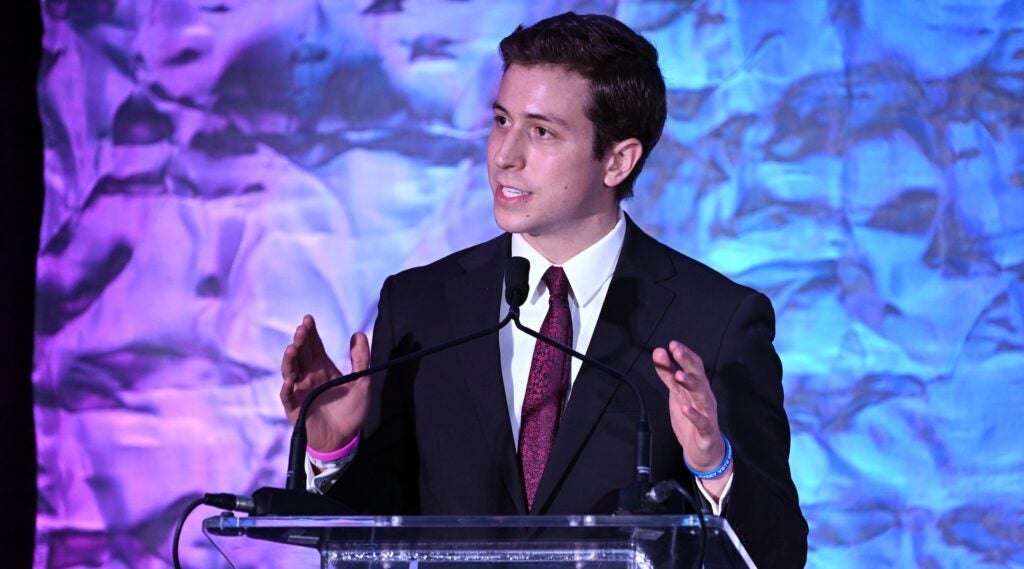
(Stephen J. Cohen/Getty Images)
Liam Elkind, 26, was the first to throw his hat in the ring, officially launching his campaign at the end of July, more than a month before Nadler announced his plan to retire. Elkind, who is Jewish, posted a video that drew comparisons to the Mamdani campaign’s fast-paced, direct-to-camera social media clips and emphasized the need for generational change in the Democratic Party.
“Today, I’m respectfully asking my Congressman, Jerry Nadler, to consider retiring,” Elkind said in the video.
But Elkind differs in many respects from Mamdani, whom he ranked fifth on his ranked-choice ballot in the Democratic primary. (Comptroller Brad Lander, the progressive Jewish politician who cross-endorsed Mamdani, was Elkind’s top choice.) A self-described “strong progressive,” Elkind embraces liberal Zionist views like “supporting Israel’s security, expressing concern for the humanitarian crisis in Gaza, and advocating a two-state solution to bring peace to the region,” according to the Forward.
A Rhodes scholar and Yale alum, Elkind has never run for public office. He is the CEO of Invisible Hands, a nonprofit that he co-founded in 2020 amid the COVID-19 pandemic restrictions, through which volunteers delivered food and medicine to those who were most “at-risk and in-need” during the pandemic. Elkind received national media attention for his work with Invisible Hands, and was named to the New York Jewish Week’s “36 Under 36” list.
Elkind went to Hebrew school and celebrated his bar mitzvah at the Stephen Wise Free Synagogue, the Reform congregation on the Upper West Side.
Following the news of Nadler’s expected retirement, Elkind thanked Nadler for his decades of service and “extraordinary commitment to New York City,” adding that the first vote he’d ever cast was for Nadler.
Two days after Nadler’s announcement, Elkind was endorsed by Howard Dean, the former Vermont governor who ran for president and lost to George Bush in 2004.
Shabbos Kestenbaum
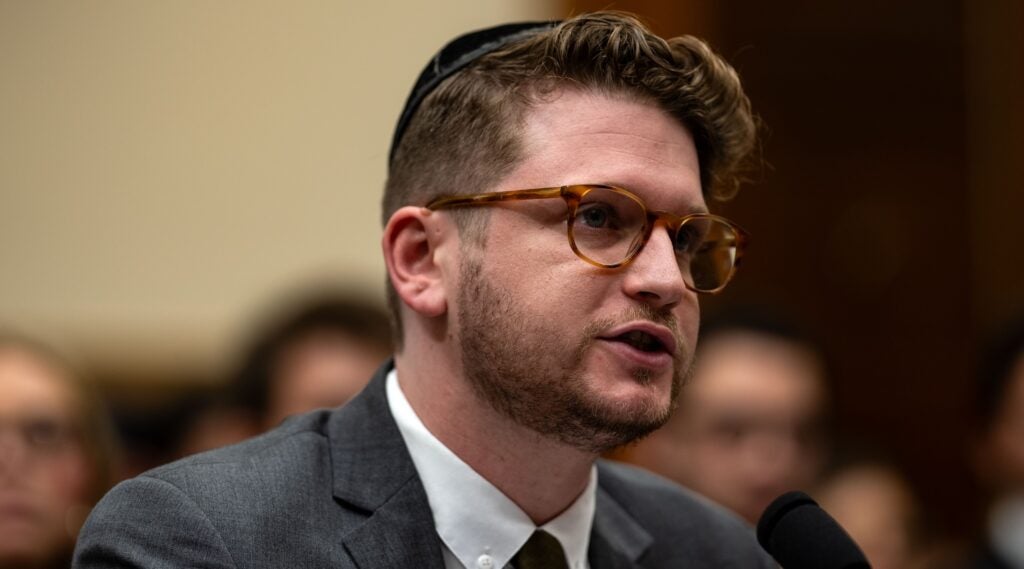
(Kent Nishimura/Getty Images)
Shabbos Kestenbaum, 26, is a Jewish activist known for his criticism of campus antisemitism. Kestenbaum, who grew up in New Jersey and later the Bronx, led a lawsuit against Harvard University, his alma mater, alleging that the university did not do enough to combat antisemitism. (Kestenbaum agreed to a confidential settlement with Harvard in May.)
Kestenbaum told Jewish Insider that he was being “encouraged to run by a group of New Yorkers from a broad ideological spectrum.”
“I am actively considering it,” he said. “If I can make a positive difference to my city and community, I would be foolish not to. There is a strong desire amongst New York Democrats for a return to normalcy.”
Initially a registered Democrat, Kestenbaum spoke at the Republican National Convention in 2024 and endorsed Donald Trump ahead of the election, citing the Democratic Party’s poor handling of antisemitism. Following Trump’s victory, he spoke at the Zionist Organization of America’s annual gala. “I very much hope to please God have a position in the Trump White House,” said Kestenbaum, who’s been a vocal supporter of the Trump administration’s crackdown on campus antisemitism. He added that he helped accompany Trump to the grave of Menachem Mendel Schneerson, known as the Lubavitcher Rebbe.
Kestenbaum has taken a hard stance against Mamdani. Despite voicing his displeasure with Andrew Cuomo, who Kestenbaum said was “disinterested” in the “concerns” voiced during a meeting with Jewish activists in the city, Kestenbaum echoed billionaire Bill Ackman in calling for voters to rally around Cuomo as Mayor Eric Adams’ reelection campaign struggles.
“I do not like Andrew Cuomo, but even I can see the writing on the wall,” Kestenbaum wrote on X. “We must put political differences aside to stop socialism and save our city this November.”
Kestenbaum attended SAR Academy, a Modern Orthodox Jewish day school in the Bronx. He was president of Hillel as an undergraduate student at Queens College. He moved to Los Angeles this past summer after taking a job with conservative media company PragerU.
Micah Lasher
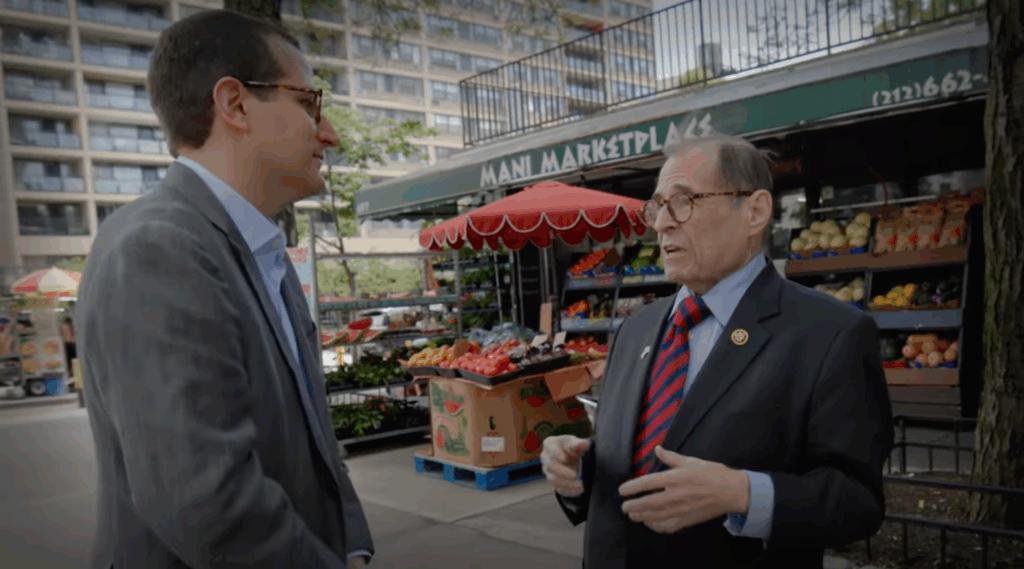
(Screenshot from YouTube)
State Assemblymember Micah Lasher, 43, has now filed to run for Congress, making him one of two candidates to have formally entered the race. Lasher is a former congressional aide to Nadler and, though Nadler has said that any decision about endorsing a successor is “way down the road,” he is expected to be Nadler’s chosen candidate.
“I’m very fond of Micah and I think highly of him,” Nadler said in a statement.
Lasher drew the ire of a handful of local rabbis in June when, days after meeting with them and discussing their concerns about Mamdani’s refusal to condemn the pro-Palestinian slogan “globalize the intifada” and about his support for the boycott Israel movement, he endorsed the Democratic mayoral nominee.
“Zohran has the talent to breathe much-needed new life into City government and the personal gifts to bring New Yorkers together around a positive vision for the future,” Lasher wrote in his endorsement.
He also acknowledged the concerns of his Jewish constituents, adding that he would “continue to be among those urging Zohran to speak with clarity when it comes to rhetoric — including the invocation or celebration of intifada — that makes Jewish New Yorkers, or any community in our city, feel threatened.”
He added, “As he moves into a position of citywide leadership, I hope that Zohran can come to better appreciate the deeply personal and historical importance that the survival of Israel as a Jewish state holds for Jewish New Yorkers.”
The night of Oct. 7, 2023, Lasher took to social media to call out what he said were disappointing responses.
“Many of the responses to the attack on Israel — with the absurd expectation that the country should now sue for peace — reveal the extent to which an anti-Semitic double-standard has become de rigueur,” Lasher wrote. “I am grateful in particular to progressive elected officials who reject this.”
After Effy’s Cafe, a kosher staple of the Upper West Side, was hit with anti-Israel graffiti in March 2024, Lasher dined there with Mark Levine, the Jewish borough president of Manhattan (and current Democratic nominee for comptroller).
“We came to show solidarity and support,” Lasher wrote. “To call this incident what it was – anti-Semitic hate. To demand that Albany expand the hate crimes law. And to make clear that New York will never be a place where this is tolerated, condoned, or chalked up to reasonable political discourse.”
Lasher, who began serving in the state Assembly in January, represents Morningside Heights, the neighborhood that’s home to Columbia University, and parts of the Upper West Side and West Harlem. He managed the 2021 mayoral campaign of Scott Stringer, who is also Jewish, as well as Jewish pol Brad Hoylman-Sigal’s campaign for NYC Council. (Hoylman-Sigal is now the Democratic nominee for Manhattan borough president.)
Lasher also worked in the Bloomberg administration, was chief of staff to the New York state Attorney General Eric Schneiderman, and was Gov. Kathy Hochul’s director of policy until resigning to pursue his current role in the Assembly. He has written legislation on issues like gun safety, the minimum wage and tackling racist, exclusionary zoning laws.
Carolyn Maloney
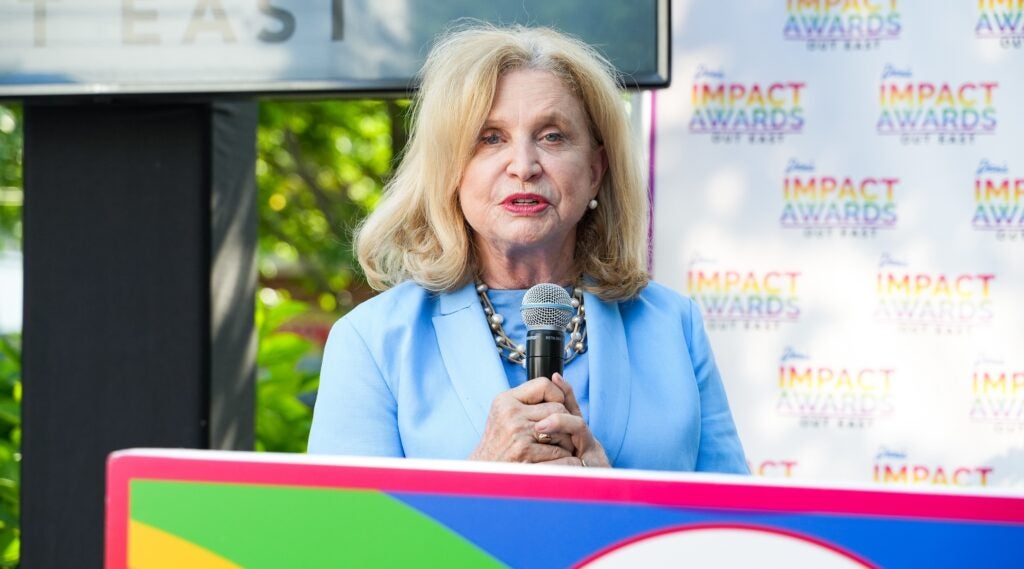
(Sean Zanni/Patrick McMullan via Getty Images)
Carolyn Maloney, 79, whose career as an elected official stretches back to 1982 when she first joined the NYC Council, spent 30 years as a congresswoman representing the Upper East Side. Her run came to an end in 2023, when a redistricting that folded the Upper East and Upper West sides into one district pitted her against her longtime ally, Nadler.
But with Nadler set to retire, Maloney said she is keeping her “options open” regarding the possibility of a return to Congress, adding, “People have been calling me, from Washington, electeds and constituents, and others, urging me to run.” Maloney is a year older than the retiring congressman but argued that New Yorkers “don’t need someone who needs an intro to Congress 101.”
Maloney has a long record of legislative work on Jewish-related issues, especially on the subject of Holocaust remembrance. She sponsored a federal bill to expand funding for Holocaust education that passed in 2020. In 2014, she introduced a bill that would cut off Nazi war criminals from receiving U.S. benefits. Two decades earlier, Maloney “started a crusade” to declassify U.S. intelligence agency documents on the Holocaust and America’s postwar dealings with former Nazis.
At a 2017 event at the Upper East Side’s Park East Synagogue, which came amid a wave of antisemitic hate crimes following the inauguration of Donald Trump, Maloney called on the U.S. Department of Justice to create an antisemitism task force, and urged Congress to double the funding for the Urban Area Security Initiative Nonprofit Security Grant Program. “Let’s not mince words, let’s call this what it is: domestic terrorism,” Maloney said during the event.
Maloney has regularly attended the JCRC’s annual Celebrate Israel Day parade. The 2021 parade was canceled due to COVID-19, but in a video shared by the JCRC, Maloney said she was joining virtually to “celebrate all Israel has given us: incredible medical and technological advancements, the game Guess Who, delicacies like Bamba and Bissli, and icons like Dr. Ruth.”
In the lead-up to the 2022 race between Maloney and Nadler, Maloney was endorsed by Elisha Wiesel, the only child of Holocaust survivor and Nobel Peace Prize winner Elie Wiesel.
“Carolyn is a close friend to the Jewish community, and her legislative priorities, votes and actions back up her words of support,” Wiesel told Jewish Insider at the time. “She has always been a strong and consistent supporter of Israel, and is a great example to other leaders of how progressive politics and support for Israel can co-exist.”
Maloney’s daughter, Virginia Maloney, is currently running for City Council in a district that covers parts of the Upper East Side and neighborhoods to its south.
Keith Powers
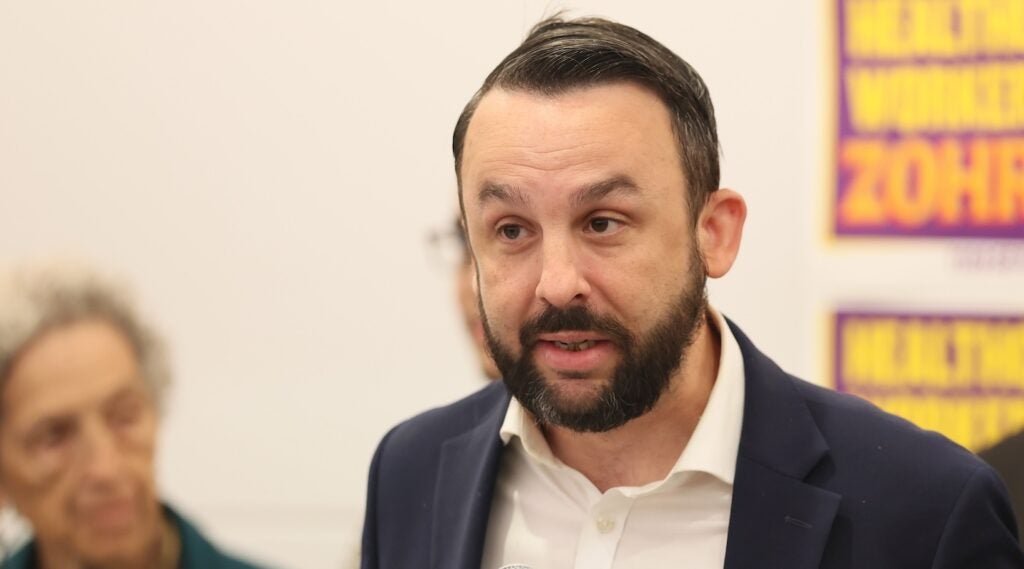
(Michael M. Santiago/Getty Images)
Keith Powers, 41, is a City Council member who’s represented the district covering part of the Upper East Side and extending south into Midtown Manhattan since 2018.
While he hasn’t spoken publicly about the race, Powers has confirmed his interest in running for Nadler’s seat, according to Politico. Powers is nearing the end of his eighth consecutive year on City Council, meaning he is term-limited and cannot run for reelection.
Powers spearheaded the campaign to rename an Upper East Side street corner after Yad Vashem, Israel’s national Holocaust memorial. He spoke at the unveiling of Yad Vashem Way in January, saying that even though not everyone who passes the sign will know what Yad Vashem is, simply having the name out there is a good thing.
“They’ll hopefully take their phone out, they’ll Google it and that will get them to get engaged,” Powers said. “And that is one of the reasons for the street renamings.”
In August 2023, Powers was one of a group of officials who called for tweaks to laws which, due to loopholes in the language, made it difficult for some cases to be prosecuted as hate crimes. Powers spoke about it outside Congregation Kehilath Jeshurun, a Modern Orthodox synagogue on the Upper East Side, explaining how numerous threats had been made against synagogues and that graffiti had been sprayed on the houses of worship.
In November 2023, Powers said he caught wind of a mailer sent by Brian Robinson, his Republican opponent in the 2023 general election, “lying about my steadfast support for the Jewish community & Israel” and “pathetically trying to imply that I support Hamas.”
Powers responded to the flyer — which accused him of “[coddling] Hamas supporters in NYC” — with a letter undersigned by more than 250 East Siders, speaking to Powers’ record as “an ardent supporter of the Jewish community.” The letter mentioned that Powers led a City Council delegation trip to Israel in December 2022, and that he’d organized a forum against antisemitism with Mayor Eric Adams earlier that year.
Powers has publicly denounced acts of antisemitic vandalism on Jewish businesses and in public places like the NYC subway.
He attended the UJA-Federation of New York’s event in Central Park commemorating the one-year anniversary of Hamas’ Oct. 7, 2023 attack.
“Joining my community tonight to mark the anniversary of October 7th,” Powers wrote. “So many of my neighbors are aching from the pain and loss of that day.”
In August, Powers endorsed Mamdani ahead of the mayoral election, writing that Mamdani’s emphasis on affordability has also been his own focus “since day one on the City Council.”
“With Donald Trump’s authoritarianism threatening our city on a daily basis, we need a Democratic Party that’s united against his attacks and supporting our Democratic nominee,” Powers wrote.
Jack Schlossberg
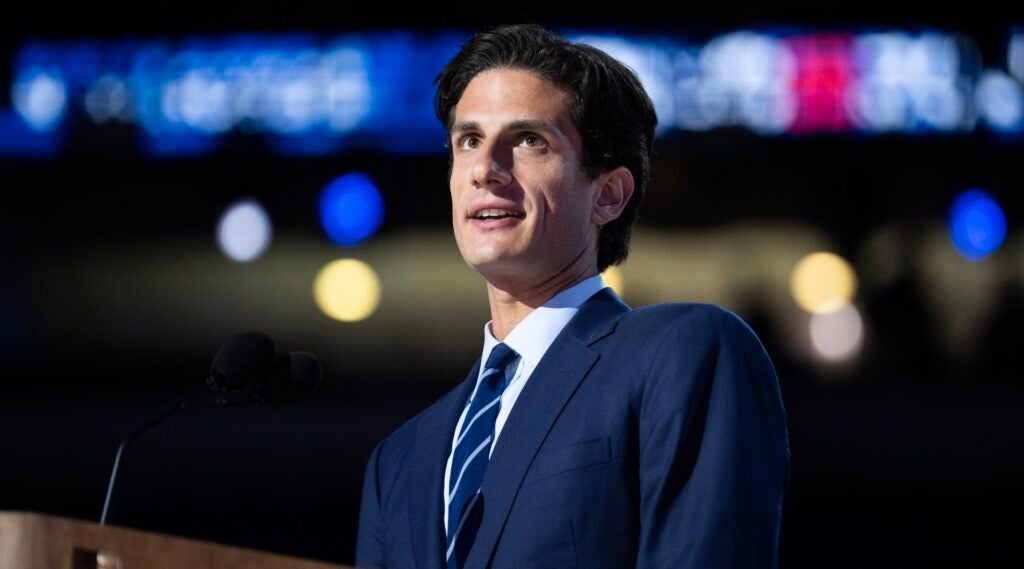
(Tom Williams/CQ Roll Call)
Jack Schlossberg, 32, is the grandson of President John F. Kennedy who has risen to prominence recently as a “progressive social media star.”
His mother is author and former U.S. ambassador to Australia, Caroline Kennedy; Schlossberg’s father is Jewish artist Edwin Schlossberg. The younger Schlossberg was raised with some Jewish traditions at home, such as incorporating Hanukkah traditions into their holiday parties, and said he feels “at least 100% half Jewish.”
Schlossberg tweeted that he has “formed an exploratory committee.” A few days earlier he’d posted an Instagram poll asking his 700,000 followers whether he should run for Congress.
Schlossberg has worked as a political correspondent for Vogue and endorsed Kamala Harris at the Democratic National Convention. Schlossberg has never held public office — a fact that Jerry Nadler himself hammered home in an interview with CNN.
“Well, there’s nothing particularly good or bad about a Kennedy holding my seat. But the Kennedy, unlike Schlossberg, should be somebody with a record of public service, a record of public accomplishment, and he doesn’t have one,” Nadler said. “And so, I don’t think he’s going to be a candidate in the end, and he certainly is not going to be a major candidate. There will be major candidates,” Nadler continued, pointing to Lasher as one example. “I’m sure there’ll be other candidates.”
Schlossberg took Nadler’s criticism in stride, writing on Instagram, “Honestly no offense taken whatsoever ! As a New Yorker, a progressive and an American, I have nothing but thanks and respects to offer Rep Nadler.”
Schlossberg endorsed Zohran Mamdani ahead of the Democratic primary, and said on Instagram that he didn’t “give a f—” that he would “piss off” former Gov. Andrew Cuomo, his cousin by marriage. In an Instagram post responding to people who ask why he supports Mamdani as a Jew, Schlossberg said, “If you think that Zohran doesn’t like Jews, you’re f–ing brainwashed.”
He added, “We cannot have this thing where if you disagree with Israeli policy, you hate Jews. That’s not good and that’s not fighting antisemitism. That’s horsesh– and that’s a cop-out.”
Whitney Tilson
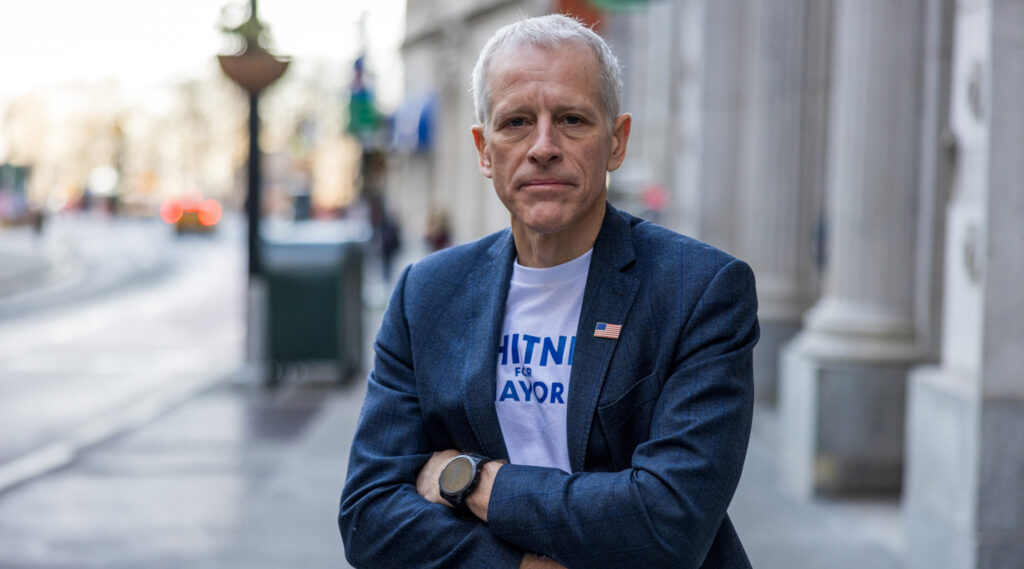
(Courtesy)
A few months removed from a seventh-place finish in the mayoral Democratic primary, Whitney Tilson, 58, a former hedge fund manager and longtime advocate of charter schools, announced that he is “considering running” for Nadler’s seat.
“This district is fortunate to be among the most educated, wealthy and powerful in the nation,” Tilson wrote, “and so the citizens here have a special responsibility to lead the fight against Trump and Trumpism, to defend the rule of law and a strong social safety net, and to support our allies, especially Israel and Ukraine.”
While Tilson himself isn’t Jewish, his wife and three daughters are; he and his family have been members of Central Synagogue in Manhattan for 25 years. Tilson told amNY that he’d planned to join an anti-Trump rally in Washington Square Park during the president’s inauguration, but that he was taken aback by the speeches and chants that he encountered. “It’s an anti-Israel rally, which is not what I was expecting,” he said.
“It’s very concerning to me that protests which at least initially appeared to be expressing sympathy to the Palestinian civilians who are suffering tremendously, and I’m very sympathetic toward that, have morphed into anti-Israel and antisemitic rallies, which is very troubling to me,” Tilson said. “I’m hearing a lot of chants that are genocidal. I know what ‘From the river to the sea’ means.”
A Harvard University graduate, Tilson voiced his anger toward his alma mater for not standing up to antisemitism in the month following the Oct. 7 attack, and said that he declined an invitation to meet with a fundraising officer.
“The damage that Harvard has done to its brand since Oct. 7 is only rivaled in history by New Coke and what Elon Musk has done to Twitter,” he wrote.
Candidates were asked during a mayoral primary debate in June whether Palestinian activist Mahmoud Khalil should be released from detention. All candidates onstage said yes except Tilson, who said he couldn’t weigh in without “knowing all the facts.”
“I don’t think the Trump administration will be able to [prove their case that he has ties to terrorism], and therefore he should be set free, but they need to make their case,” he said.
Met Opera adapts Michael Chabon’s Jewish novel ‘Kavalier & Clay’ for the stage
Jewish author Michael Chabon’s Pulitzer Prize–winning novel, “The Amazing Adventures of Kavalier & Clay,” is part comic-book origin story, part immigrant saga and part love letter to New York City at its most scrappy and dazzling.
Published in 2000, the novel follows the trajectory of Joe Kavalier, a Houdini-obsessed escape artist who flees Nazi-occupied Prague, and his quick-witted Brooklyn cousin, Sammy Clay. Together they conjure The Escapist, a superhero who punches Nazis on the page while, at the same time, the cousins wrestle with them in real life. The duo’s ascent in the comic book world mirrors the Golden Age of American comics, and the novel delves into themes of Holocaust trauma, Jewish identity, ambition and the transformative nature of pop culture.
And now, 25 years after the novel hit shelves, The Metropolitan Opera is opening its 2025-26 season with a new adaptation of Chabon’s bestselling book. Premiering on Sunday, “The Amazing Adventures of Kavalier & Clay,” the opera, reimagines Chabon’s deeply Jewish comic-panel world for the opera stage, with a score that blends orchestral, jazz and electronic music.
At first glance, an opera based on a book about comics seems like an unlikely combination of high culture and lowbrow. But according to director Bartlett Sher, whose résumé includes the Broadway revivals of “Fiddler on the Roof” and “South Pacific” — as well as eight previous Met productions — there’s a natural affinity between comics and opera, as both are rooted in the storytelling of lived experiences.
“Opera is a very good way to tell this story,” Sher said. “It can kind of cover a lot of time. It can take us to a different world; the music does a lot of that work. I had to build a world in which you can easily, and swiftly and satisfyingly, move from Prague to Brooklyn to a toy factory to the top of the Empire State Building. That’s just a fun challenge.”
Another challenge the creators faced was how to imbue the opera with the inherent Jewishness of the novel — a task that composer Mason Bates took head-on. Over the course of six months, Bates, who is not Jewish, attended services at Congregation Emanu-El in San Francisco, where he lives, to learn more about Jewish culture and tradition.
While searching for a Jewish song of resistance to include in the opera, he came across a version of “Ani Ma’amin” — a song of hope that was reportedly composed in 1942 by Rabbi Azriel David Fastag on a boxcar on the way to Treblinka. Bates loved the musicality of it and incorporated a solemn rendition into the opera with traditional accompaniment. In “The Amazing Adventures of Kavalier & Clay,” “Ani Ma’amin” is sung by a chorus of European Jews as they are carted off to Auschwitz.
“Ani Ma’amin” will also be performed at a “Kavalier & Clay” event at Temple Emanu-El’s Streicker Cultural Center (1 East 65th St.) on Tuesday, in one of several public programs sponsored by the Met. At the free event, members of the cast will perform selected numbers from the opera, and Bates, Sher and librettist Gene Scheer will discuss how the creators captured “the essence of New York Jewry,” among other things.
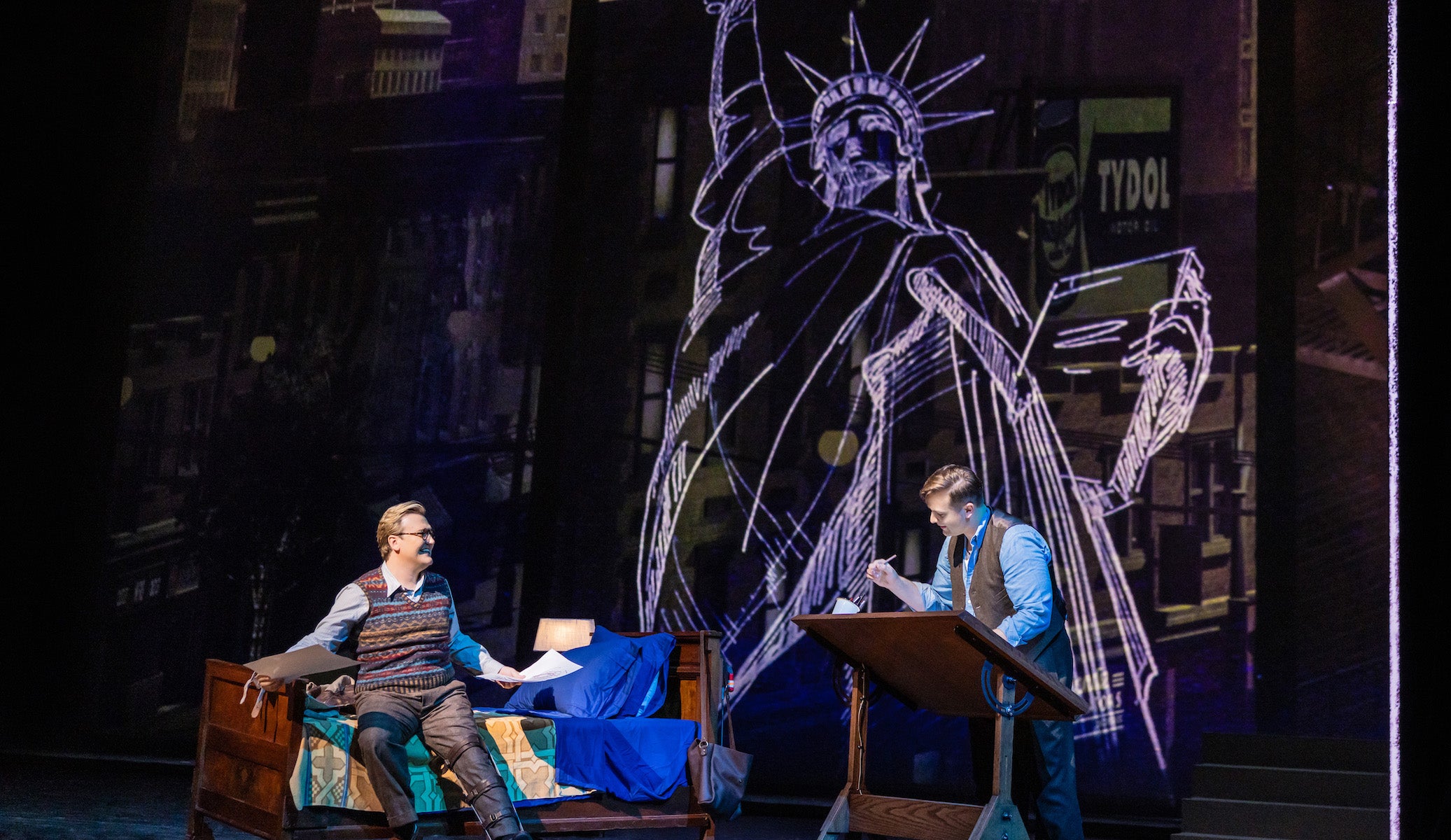
Miles Mykkanen as Sam Clay and Andrzej Filończyk as Joe Kavalier in a scene from Mason Bates’s “The Amazing Adventures of Kavalier & Clay.” (Evan Zimmerman / Met Opera)
According to immigration historian Miriam Mora — who organized the public programs about the Jewish origins of the comic book industry — Chabon’s novel “played a crucial role in elevating the Jewish history of the comics industry” when it was published 25 years ago.
“It was an incredibly important book for people’s understanding of the comic book industry as a Jewish one,” said Mora, managing director of the Raoul Wallenberg Institute at the University of Michigan. “Until ‘Kavalier & Clay’ came out, which is fiction, but fictionalizes a very real part of American Jewish literary history, it was a pretty unknown story. Since the book was released, interest in this story as a Jewish story, or in the comic book industry as being tied into the Jewish story, has been exponentially higher.”
The Met is also leaning into the World War II setting of the novel, specifically how the protagonists confront fascism and the approaching specter of the Holocaust. “With autocracy on the rise, ‘Kavalier & Clay’ couldn’t be more timely,” Peter Gelb, the Met’s general manager, said in a statement. “Mason’s epic of an opera, although set during World War II, should be an inspiration to those who wish to see present-day fascism defeated.”
As for director Sher, working on “Kavalier & Clay” was a way to connect with his Jewish identity. (Sher grew up Catholic but found out as a teenager that his Lithuanian-born father was Jewish.) Sher told New York Jewish Week that he feels “a responsibility” to accurately portray the Jewish perspective in “Kavalier & Clay.”
“I’m mostly there to help audiences see the truth of where we come from and who we are now,” he said.
Many of the topics addressed in the novel — such as antisemitism, homophobia and tensions over immigration — are sharply relevant today. Just as the novel has continued to resonate with readers over the past quarter-century, Sher hopes the opera adaptation will connect with new and sympathetic audiences.
“This feels like the right story to tell at this time,” Sher said. “The Jewish history of the world, the Jewish commitment to what’s right, is very deep in the piece. And I have a lot of respect and love for that as a person who grew up respecting that culture very deeply.”
Ohio auction house halts sale of paintings looted during the Holocaust and billed as ‘unclaimed property’
Two 17th-century paintings have been taken off the auction block after a Holocaust art restitution organization determined that they had been looted from a German Jew’s collection in France during World War II.
The two paintings, believed to be by Dutch artist Ambrosius Bosschaert, were set to be sold at an auction house in Newark, Ohio, this month until a tip submitted to the Monuments Men and Women Foundation prompted the group to intervene.
The foundation, which is dedicated to recovering European artworks stolen during World War II and is named for the Allied military group, researched the pieces and discovered that they originally belonged to the family of Adolphe Schloss, a German Jew whose 333-work collection was seized and divided by the Nazis during World War II.
The discovery of the two paintings comes weeks after Argentine police recovered a painting that the Nazis looted from a Dutch Jewish art dealer during the Holocaust.
The painting, “Portrait of a Lady” by Giuseppe Ghislandi, was first discovered last month in photos of a real estate listing by the daughter of a Nazi finance official who fled to Argentina after World War II.
Now, the paintings in the auction in Ohio underscore how many looted works have yet to be recovered and the range of circumstances in which they are being found.
The Schloss collection, including the two paintings discovered in Ohio, was stored at Hitler’s headquarters in Munich before being stolen in the final days of the war as Allied forces entered the city. Schloss’ children survived (he had died in 2010) but were reunited with only some of their art.
After receiving the tip about the art sale in Ohio, Robert Edsel, the founder and chair of the Monuments Men and Women Foundation, flew to Newark to meet with the owners of the Apple Tree Auction Center and explain the painting’s history.
“Within 48 hours of receiving this lead, the Foundation documented the provenance of the works that supports the Schloss ownership, inspected the two paintings in person, attained the cooperation of the auction house to remove the pictures from their sale, and reached out to the attorney for the Schloss heirs,” Edsel said in a statement. “We look forward to completing this collaborative approach to resolving this matter and we hope they will return to the Schloss family soon.”
The two still-life oil paintings of flowers were listed as unclaimed property on the auction house’s website, which has not disclosed the name of the consignor to the foundation.
Looted paintings could have wound up there in a variety of ways. Some Nazis — including John Demjanjuk, convicted in 2011 of war crimes related to 27,000 murders at the Sobibor concentration camp — wound up in Ohio and elsewhere in the Midwest. But looted art also came home on occasion with U.S. soldiers as souvenirs of their time liberating Europe from the Nazis.
The foundation is seeking to obtain the name of the bank that owned the safety deposit box so they can turn over custody of the paintings to the Schloss family.
The highest bids for the paintings were listed on the auction house’s website as $3,250 and $225, but Edsel told Art News that the paintings could be valued at over $500,000.
“These two paintings surfaced at a small auction house in the Midwest, but it could have happened anywhere,” Anna Bottinelli, the foundation’s president, said in a statement. “Hundreds of thousands of cultural objects looted during WWII are still missing. Some are in the United States, tucked away in attics, hanging on walls, and stuffed in unopened boxes, passed down through generations.”
Israeli conductor calls for end to Gaza war in London concert: ‘What’s happening now is atrocious’
An Israeli conductor called for an end to Israel’s war in Gaza during concert at Royal Albert Hall in London Thursday, warning the audience that “every moment that passes puts the safety of millions at risk.”
“In my heart, there is great pain now, every day, for months. I come from Israel and live there. I love it, it’s my home, but what’s happening now is atrocious, and horrific in a scale that’s unimaginable,” Volkov said at the end of the concert with the BBC Scottish Symphony Orchestra.
Many members of the audience cheered Volkov’s address, but there were also some jeers, to which he replied, “You can go if you don’t want politics. Politics is part of life every day.”
In his remarks, which drew loud cheers and applause from the audience, Volkov decried the killing of “innocent Palestinians” as well as the Israeli hostages “kept in inhumane conditions for two years.”
He alluded to the gap between the vast majority of Israelis who want the war to end with a deal to release the hostages and the government, which is pressing forward despite public sentiment.
“Israelis — Jews and Palestinians — we are not able to stop this alone. I ask you, I beg you all to do whatever is in your power to stop this madness. Every little action counts while governments hesitate and wait,” Volkov concluded. “We cannot let this go on any longer. Every moment that passes puts the safety of millions at risk.”
Volkov’s address comes as the societal reckoning over the Gaza war flares in the classical music world. The day before his Royal Albert Hall concert, a Belgian music festival canceled the performance of the Munich Philharmonic because it was being led by Lahav Shani, the music director of the Israeli Philharmonic.
“Lahav Shani has spoken out in favour of peace and reconciliation several times in the past, but in the light of his role as the chief conductor of the Israel Philharmonic Orchestra, we are unable to provide sufficient clarity about his attitude to the genocidal regime in Tel Aviv,” the Flanders Festival Ghent said in a statement Wednesday.
The organizers said the decision was made in order to “maintain the serenity” of the festival and “safeguard the concert experience for our visitors and musicians. ”
The cancellation drew condemnation from several European leaders, including Wolfram Weimer, the German culture minister, who said the decision was a “disgrace for Europe” and “blatant antisemitism” in a post on X.
Belgian Prime Minister Bart de Wever, who recently drew Israeli condemnation for planning to recognize a Palestinian state, also rebuked the decision. He traveled to Germany to see Shani conduct on Saturday.
“There will never, ever be any room for racism and antisemitism in this country,” de Wever tweeted along with a photo showing him shaking hands with Shani. “I insisted on conveying this message to him personally and expressing my appreciation for his contribution to the power of music.”
An online petition calling on the Ghent festival to reverse its decision, led by prominent classical musicians including Jewish conductor Joshua Weilerstein, has drawn over 16,000 signatures.
“This decision will do nothing to save a single Palestinian life, bring a hostage home, or to make any improvement to the unbearable civilian suffering currently taking place in this conflict,” the petition read. “It will, however, resonate loudly with those who equate an artist’s nationality with an excuse to exclude them from the cultural sphere.”
‘Free Palestine,’ Jewish actor Hannah Einbinder says in Emmys speech as Hollywood debates growing Israeli film industry boycott
Hannah Einbinder made her ardent pro-Palestinian views known on one of the entertainment industry’s biggest stages when she won an Emmy award for best supporting actress in a comedy Sunday night.
“Go Birds, f— ICE and free Palestine,” the Jewish comedian and actress, wearing a red Artists4Ceasefire pin, said to cheers during her acceptance speech for her role in the HBO show “Hacks.”
The pointed political commentary (mixed in with a cheer for the Philadelphia Eagles) came as Hollywood continued to wrestle with a growing petition to boycott Israeli film institutions amid its ongoing war in Gaza. Einbinder, a vocal pro-Palestinian advocate, was an early signatory to the petition circulated by Film Workers For Palestine and one of the most prominent Jewish names on a list of entertainment industry personnel that now numbers more than 4,000.
That list also includes several top-draw talent and filmmakers, including Emma Stone, Adam McKay, Ava DuVernay, Ayo Edebiri, Ilana Glazer, Abbi Jacobson and Yorgos Lanthimos. More notable Jewish names have joined the list since its release, including actor Andrew Garfield, whose father is Jewish; musician Mica Levi, who scored the Holocaust drama “The Zone of Interest”; and Rebecca Lenkiewicz, the screenwriter of acclaimed Jewish-themed films “Ida” and “Disobedience.”
Two days prior to the Emmys, Paramount — whose network CBS aired the telecast — became the first major American studio to publicly oppose the boycott.
“We do not agree with recent efforts to boycott Israeli filmmakers. Silencing individual creative artists based on their nationality does not promote better understanding or advance the cause of peace,” the company said in a statement. “The global entertainment industry should be encouraging artists to tell their stories and share their ideas with audiences throughout the world. We need more engagement and communication — not less.”
Both Paramount’s former chair Shari Redstone and David Ellison, its new owner following a high-profile merger, are Jewish and avid supporters of Israel. Ellison is rumored to be planning to install a pro-Israel media executive, The Free Press editor Bari Weiss, into a leadership role at CBS News. The studio is also reportedly preparing a bid to acquire rival studio Warner Bros. Discovery, which also owns HBO.
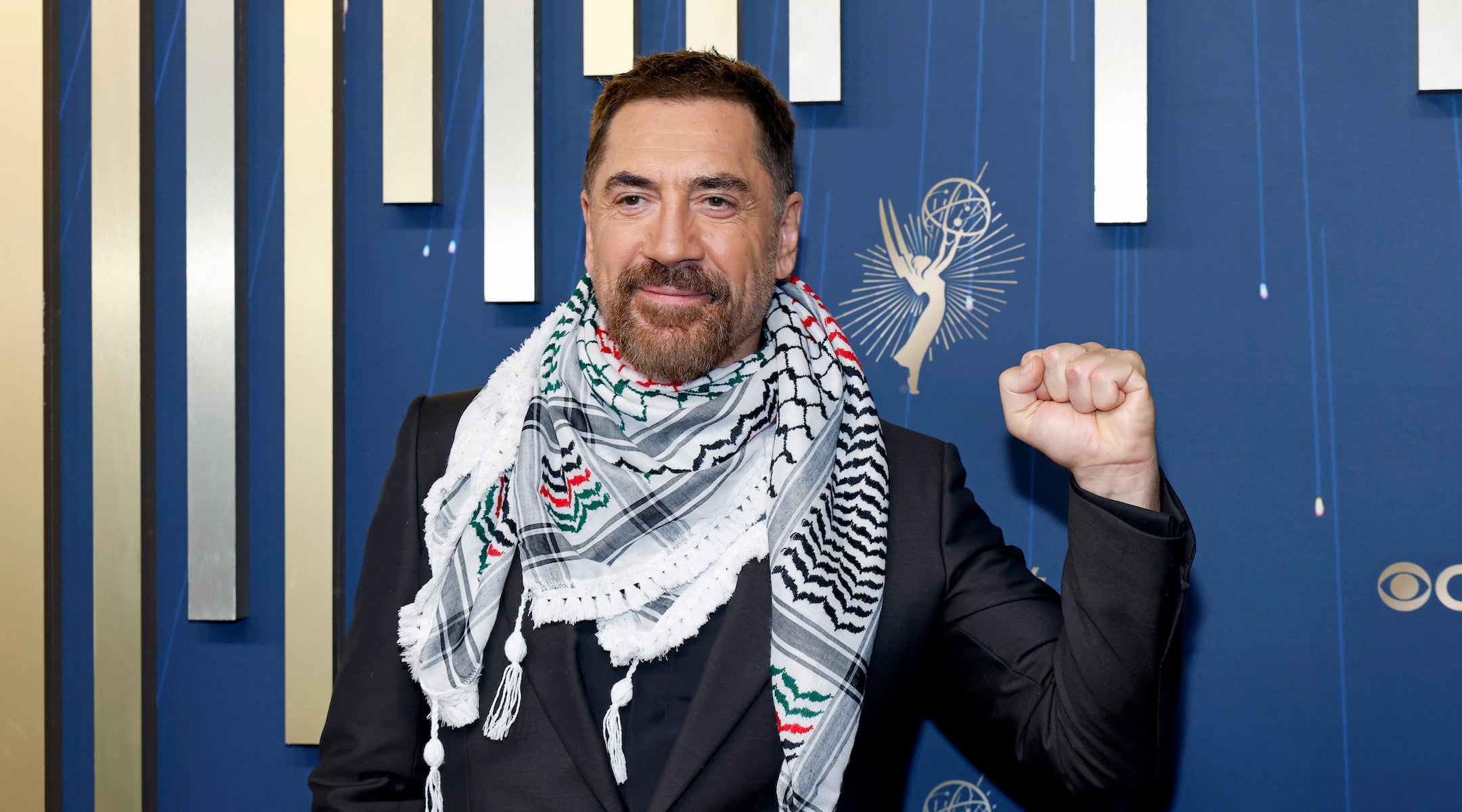
Javier Bardem attends the 77th Primetime Emmy Awards at Peacock Theater on September 14, 2025 in Los Angeles, California. (Kevin Mazur/Getty Images)
One of the boycott’s biggest supporters, actor Javier Bardem, responded to Paramount’s objections on the Emmys red carpet Sunday.
“I want to clarify something based on Paramount’s letter,” Bardem, wearing a keffiyeh, told Variety. “Film Workers for Palestine do not target any individuals based on identity. The targets are those film companies and institutions that are complicit and are white-washing or justifying the genocide and its apartheid regime. We do stand with those who are helping and being supportive of the oppressed people.”
Bardem added, “I cannot work with someone that justifies or supports the genocide. That’s as simple as that.” (He wasn’t the only red-carpet personality to sport pro-Palestinian garb: A non-Jewish “Hacks” castmate of Einbinder, Megan Stalter, wore a sign reading “Ceasefire!” on her handbag as she walked the red carpet.)
Einbinder herself elaborated on her acceptance speech in interviews after her win. “It is my obligation as a Jewish person to distinguish Jews from the state of Israel, because our religion and our culture is such an important and long standing institution that is really separate to this sort of ethno-nationalist state,” she said backstage, adding that she had “friends in Gaza who are working as frontline workers, as doctors.” She, too, insisted the boycott was not intended to target individuals.
In its own statement, Film Workers for Palestine also accused Paramount of “intentionally misrepresenting” the boycott. Like Bardem, the group said the boycott did not apply to Israeli individuals, only to institutions. Israeli entertainment-group leaders have disputed this claim, responding that all Israeli creatives work with the targeted institutions and would be harmed by a boycott.
Other Jewish winners at the Emmys on Sunday included Seth Rogen, whose Apple TV+ sitcom “The Studio” took home several comedy awards, and the HBO documentary “Pee-Wee as Himself,” a posthumous portrait of Jewish actor Paul Reubens.
Comic Gianmarco Soresi mines his mixed Jewish background for laughs
When critically acclaimed stand-up comedian Gianmarco Soresi introduces himself to a new audience, he explains that his father is Italian, his mother is Jewish, and that he identifies as a “cultural Jew.”
That, he says, “means I have all the gastrointestinal problems and stress and anxiety of regular Judaism — without the sweet comfort of God.”
The line always gets a big laugh, and draws on a nuanced relationship with Judaism that he mines for laughs and which he elaborated on in an interview with the Jewish Telegraphic Agency, discussing his family, his formerly Orthodox girlfriend, antisemitism and his disillusionment with Israel.
The 37-year-old Soresi has seen his online popularity explode in recent years, as he joins a generation of comics finding audiences outside the comedy clubs. After amassing more than one million followers on TikTok, another million on YouTube, and 800,000 on Instagram, Soresi will debut his first full-length special, “Thief of Joy,” on his YouTube channel on Sept. 19.
The special displays Soresi’s strong writing and storytelling skills and cleverly crafted punchlines: Variety, naming him one of “10 comics to watch out for in 2025,” described “his knack for filtering life through a dark prism.” (Deadline also named him to its “Future of Funny” list for 2025.)
Soresi’s quick rise, however, has largely been fueled by his popular crowd work videos, which feature lightning-fast improvisation with audience members, as well as what the New York Times described in 2023 as his “silkily feline physicality and frenetic gesticulation.”
In a typical piece of crowd work, an audience member pipes up during a bit about people who are polyamorous. “I know you have a girlfriend, but you’re on the road all the time,” they ask. “Are you in an open relationship?” Soresi’s response: “Are you kidding? My girlfriend grew up Hasidic. I’m just lucky that she lets me mix meat and dairy products!”
In a recent interview, Soresi shared more details about his Jewish background and experience. Raised in Potomac, Maryland, Soresi said his parents divorced before he was a year old.
“My mom’s maiden name was Rothkrug, and she grew up in Great Neck, on Long Island. When she was 12 her parents told her she could either have a bat mitzvah or a Sweet 16 — and she decided to wait for the latter,” he said. There was no religious influence from his father, who Soresi describes as a “lapsed Catholic.”
Soresi himself did not have a bar mitzvah, but “I wouldn’t necessarily call my upbringing secular,” he said. “We did go to temple twice a year, we did Hanukkah, and we also did Passover — which was my favorite because it made the Jews seem cool.”
In addition, Soresi, a passionate “theater kid” who would earn a degree in musical theater from the University of Miami, got to perform during seders. “I really liked reading at the table,” he said.
While his mother married twice and his father was married and divorced three times, Soresi has been in a committed relationship for more than five years with Tovah Silbermann, who was raised in New Orleans in a Chabad community. After attending Yeshiva University, “she wanted to leave what I would call the strictness of that life and just gradually pivoted away, although her family remained Orthodox,” he said.
Soresi recalls an awkward moment when Tovah’s younger sister attended one of his shows, and he breached a rule of Orthodox etiquette. “Given my Italian side, I’m a hugger,” he recalled. “So I wrapped my arms around her and multiple people said, ‘no, no!’ It’s a horrible feeling to hug someone and have people shout ‘no!’”
Silbermann — a talent manager who is listed on Soresi’s new special as executive producer, manager and muse — remains connected to her family and Judaism. “Unfortunately, I’m not in town a lot on Friday nights, which is sad for her, because she wants to do Shabbat dinner,” said Soresi. Shabbat dinner, he has said, “is like a standing date for Jews to get together every week.”
Silbermann declined to comment, but in a recent episode of Soresi’s popular podcast, “The Downside,” she offered a fairly lengthy primer on the kosher laws, the distinction between the Hebrew Bible and the Talmud and the laws of conversion. In the same conversation she acknowledged that in the beginning of their relationship she found herself missing the Jewish rituals and customs she shared with old friends.
“That was a struggle for me,” said Silbermann. “It’s like, how do you integrate two lives?” In time, she added, she’s gotten accustomed to the choices she made, and said, “This is my thing.”
Soresi sprinkles references to their varied Jewish backgrounds throughout his appearances. “Tovah and I once got stuck in terrible traffic in Miami, and she yelled ‘Let my people go!’” He also picks up on antisemitism, intentional or not. During crowd work at a New Hampshire show earlier this year, he was speaking with a woman named Carol about whether she was raising her daughter to be religious. “Well, I did bring her to church,” Carol said. “But not Catholic; that’s worse than Jewish.” Soresi flinched theatrically, and the audience gasped before howling with laughter. “OK, let’s rank all the religions,” was his comeback. “What kind of Christian are you? Nazi?!”
When he was 24, Soresi went on Birthright, the free trip to Israel offered to young Jewish adults. “It wasn’t a particularly political trip, and I wasn’t necessarily paying the closest attention. But I had exposure to a lot of Jewish people that I hadn’t interacted with in my own life,” he recalled. “And the soldiers who joined us for a couple of days seemed to be on the left side politically, talking about how they believed in a two-state solution.”
These days, Soresi is an outspoken critic of Israel and its actions in Gaza, as well as its policies toward Palestinians in general. He’s incensed with American Jews who equate such criticism with antisemitism, and he often receives vicious comments online.
“Jewish people have written me the most angry emails of late, like, ‘you’re just pretending to be Jewish.’”
While many liberal Jews have been critical of Israeli Prime Minister Benjamin Netanyahu and his extreme right-wing coalition, Soresi goes further by declaring he’s not a Zionist.
In a July appearance at Montreal’s “Just For Laughs” comedy festival, Soresi told the crowd he might be in favor of a three-state solution: one for Zionist Israeli Jews, one for Palestinians and one for secular, cultural Jews like himself.
When a reporter reminded him of that, he said, “Let me be clear. That wasn’t exactly a real policy proposal!” As to whether he considers himself anti-Zionist (opposing a nation-state that privileges Jewish citizens) or non-Zionist (supporting a Jewish homeland for others but not necessarily a nation-state), Soresi said he would prefer not to “quibble.”
“I would say I’m extremely anti what is being done to the Palestinian people in this moment,” he said.
As always, though, Soresi manages to create comedy from calamity. “I have an Israeli barber,” he recently said onstage, “and while he was cutting my beard, he asked me my thoughts about Israel and Palestine. And I noticed that the closer the blade got to my throat, the more I was getting pro-Israel.”
Soresi’s career has clearly hit a sweet spot. In addition to the YouTube special, his live shows, podcast and periodic acting roles, his recent international tour was a sold-out success.
Soresi and Silbermann have just moved from Manhattan’s Lower East Side to Brooklyn. After five years together, might there be an announcement involving a chuppah and a broken glass?
“Um, did my girlfriend put you up to this?” he said, laughing. “I love her very much and we have an incredible life.”
Gianmarco Soresi’s special “Thief of Joy” debuts Sept. 19 on his YouTube channel.










